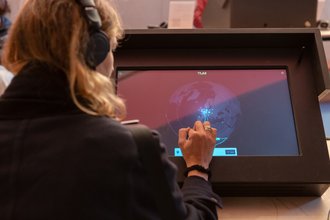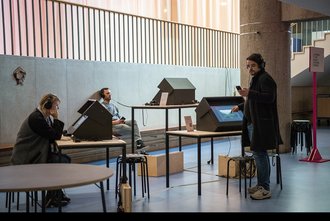
Users can take an auditory journey through the worlds of cultural listening and hearing techniques at https://listeningmap.de. Radio waves are not bound by borders and the globe shown on the platform is free of any state or territorial markings. The globe is marked with the places that were visited over the course of the three-year span of the »Listening to the World – 100 Jahre Radio« artistic research project. Prof. Nathalie Singer, together with Frederike Moormann and Lefteris Krysalis organised workshops with sound practitioners and theorists in Montevideo (Uruguay), Sagada (Philippines), and Johannesburg (South Africa). Nearly twenty local and international global experts from South America, Southeast Asia and Southern Africa took part in the project, from instrument makers to sound artists and radio historians.
Together, they explored radio’s colonial infrastructures, analysed it as a tool of resistance, and compared listening across their own languages and cultural backgrounds. The Map illustrates the results and recordings of the artistic research, explores questions of transnational listening, and draws transcultural connections between international radio and sound projects. It also combines artistic and scientific approaches in audio, video, and text formats. The website provides a real-time 3D visualisation of the geographical and content-related relationships between the individual stations. Users can browse through the content using searches, links, and through association. An additional feature is the real time player, which generates subtitles and a navigable transcription; this allows users to explore the audio content to find specific points. The platform was developed by NEOANALOG, a Cologne-based company.
»We are so excited to present the Transcultural Listening Map, an acoustic map of the world that tracks listening and the impact of radio in an international context«, explains Nathalie Singer, Professor of Experimental Radio in the Faculty of Art and Design. »The website allows users to explore auditory connections that reach beyond territorial borders. Our hope is that the map continues to grow and be a valuable source for further research in the field of radiophonics. We invite sound artists and theorists to submit their own work to further enrich and expand the network.«
You can watch a short video illustrating how the website works here: https://vimeo.com/1013421940/91aec56468?share=copy
Over a three-year period, the »Listening to the World – 100 Jahre Radio« artistic research project has been dedicated to listening to radio and its impact in an international context. Anyone interested can explore the map and talk to the individuals behind its creation in October 2024 at the Haus der Kulturen der Welt in Berlin and at the PAD-Festival in Wiesbaden.
Transcultural Listening Map
https://listeningmap.de
Event Launches:
Saturday, 19 October 2024, noon until midnight
»Listening to the World – 100 Jahre Radiokunst«
Location:
Haus der Kulturen der Welt
John-Foster-Dulles-Allee 10
10557 Berlin
www.hkw.de
Livestream radio programme from Berlin, Harare and Capetown on Cashmere Radio at https://cashmereradio.com, in streaming format at www.bauhaus.fm and in Weimar on 106.6 MhZ.
24 to 27 October 2024
PAD – Performing Arts & Digitalität
https://performingarts.digital/programm/transcultural-listening-map
Opening Times:
Thursday, 24 October 2024, 2:30 - 5:30 pm
Friday, October 25 and Saturday, October 26, 10 am - 5:30 pm
Location:
Heimathafen
»Civilkammersaal«
Gerichtsstraße 2
65185 Wiesbaden
The installation can be visited at the times listed above; reservations are not required. The installation is closed during conference events. Entrance is free of charge!
»Listening to the World – 100 Years of Radio« is a collaborative project between the Goethe-Instituts, the Department of »Experimental Radio« at the Faculty of Art and Design at the Bauhaus-Universität Weimar, Deutschlandfunk Kultur and the Haus der Kulturen der Welt. It was funded by the Goethe-Institut and through the »New European Bauhaus« project of the Bauhaus-Universität Weimar. Development of the »Transcultural Listening Map« was supported by the Bauhaus-Universität Weimar Kreativfonds.
Artistic Direction: Prof. Nathalie Singer
Web Design and Programming: NEOANALOG Schmitz & Rabe GbR
Concept and Editorial: Lefteris Krysalis, Frederike Moormann, Nathalie Singer
Editorial Assistance: Tilman Böhnke
Project Coordiation: Sandra Rücker, Vitalis Neufeld
Translation and Transcription: Elizabeth Marie Watts, Silvana Callegari, Matthew Lloyd
Questions can be directed to Romy Weinhold, Press and Public Relations Officer for the Faculty of Art and Design by phone at +49 / 36 43 / 58 11 86 or by e-mail at romy.weinhold[at]uni-weimar.de.





